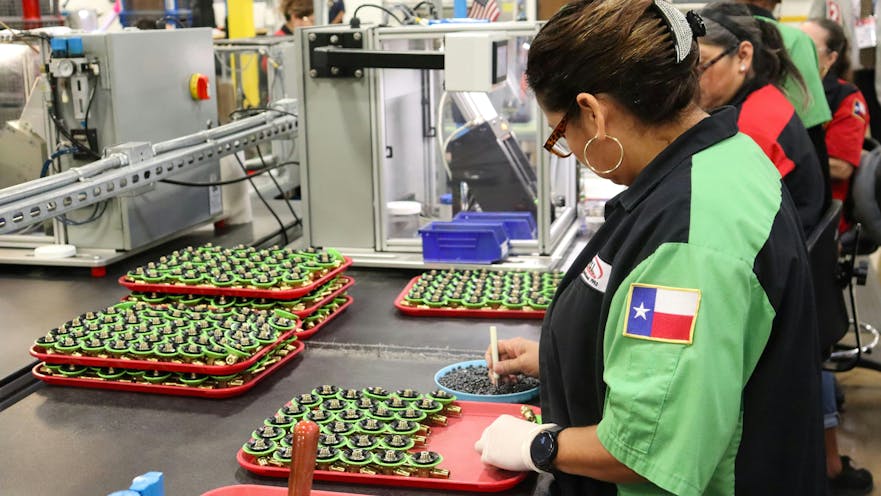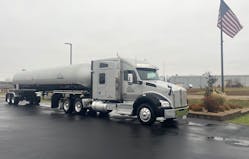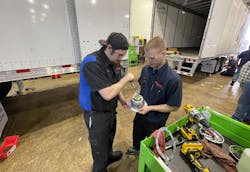SAN ANTONIO, Texas—About 75-80% of new trailers come equipped with an automatic tire inflation system, and according to Pressure Systems International leaders, two-thirds of those are the Meritor Tire Inflation System (MTIS) by P.S.I. It's an impressive swathe of the market that P.S.I. expects to grow next year—and it tells only half of the company's success story.
The 30-year-old Texas-based company is well positioned to capitalize on upcoming legislation that requires all European trailers manufactured after July 2024 to feature automatic tire inflation or tire pressure monitoring systems, and many U.S. fleets are still retrofitting older trailers with MTIS systems to increase tire life and fuel economy and reduce costly breakdowns that leave drivers stranded on the roadside.
"We'll likely start running it," Joe Blankenship, FMC Transport fleet operations manager, predicted after attending the 2023 Fleet Tech Event hosted by P.S.I. and Cummins-Meritor Nov. 15-16. "We'll probably do some retrofits to see how it works and go from there, and maybe start spec'ing the system on new tank trailers
"It has a lot more to offer than what we're currently using."
Those offerings include visual tire pressure and wheel-end alerts, integrated telematics that enable predictive maintenance, and, starting in April 2024, newly won guidelines in the Commercial Vehicle Safety Alliance's North American Standard Out-of-Service Criteria handbook that will allow trucks with operable automatic tire inflation systems to avoid falling out of service—even when a tire has a noticeable leak.
"The tire will still be documented as a violation," Wayne Skinner, Ozark Motor Lines vice president of fleet maintenance, noted enthusiastically. "However, this update will afford us the flexibility to repair the tire before the vehicle is re-dispatched—and will reduce the total CSA [Compliance, Safety, Accountability] score impact.
"Updates like this encourage fleets to make investments and adopt technologies that are designed to make them safer and more efficient."
The long-running event also offered more than P.S.I.'s standard return-on-investment pitch on the benefits of tire inflation and disadvantages of deflation, delivering presentations by Kerri Wirachowsky, CVSA director of inspection programs—who's responsible for updating the OOSC handbook—Mike Roeth, North American Council for Freight Efficiency (NACFE) executive director; and Chris Spear, who detailed his journey to leading the American Trucking Associations as its ninth president and CEO, called out the political divisiveness truckers face today, and praised P.S.I., Meritor, and Cummins for their leadership and innovation.
"These are companies with immense pedigree—established brands that absolutely contribute real solutions for our industry and the economy," Spear said.
See also: Bridgestone, Geotab partner to bring IntelliTire TPMS to fleets
Simple, effective assistance
FMC, a Coastal Energy company, is an asphalt distributor for plants in Miller and Willow Springs, Missouri, and Clinton, Oklahoma. Its fleet includes 60 trucks and over 200 tank trailers, including Etnyre trailers for asphalt; Heil and Polar Tank trailers for gasoline, diesel, ethanol, and biodiesel; and Countryside and Westmor Industries units for propane, most of which are equipped with a competitor's tire inflation system that sometimes starts leaking air through the axles. "The downfall is our technicians are taking the units off instead of trying to repair them because we really don't understand how to repair them in the axle," Blankenship explained.
"The Meritor system seems a lot simpler when it comes to replacing parts."
In San Antonio, he learned P.S.I. invented tire inflation technology, partnered with Meritor for North American sales, marketing, and service in 1998, and introduced TireView TPMS for commercial vehicles in 2018. P.S.I. this year unveiled a new banner celebrating 2,034,196 units sold as of October 2023 during the annual tour of its well-stocked San Antonio factory. The company sold 1.8 million systems through May 2021.
The MTIS system consists of a control box, air lines, and fittings, axle “press plugs” with ThermAlert eutectic screws, “stator” tubes, rotary union “thru-tees,” tire hoses, available “check port” hoses for easy gauge access, and a driver warning light. The system sends pressurized air from a trailer’s air tank into the control box, where it’s filtered and regulated, then routed through the hollow axle, rotary union, and hoses into the tire.
Blankenship indicated he most appreciated the system’s tracking capabilities and data generation, allowing his team to recognize patterns and adjust accordingly. “For the most part, our drivers do a good job, but at the end of the day, humans aren’t perfect, so we do have issues with tires running low or even flat.
“That’s why tire inflation systems are crucial.”
Proactive tire performance
Skinner agrees. Ozark, a 62-year-old, family-owned dry van carrier headquartered in Memphis, Tennessee, maintains a fleet of 750 Freightliner trucks and 2,300 Hyundai Translead dry van trailers that didn’t use automated tire inflation before he arrived from FedEx Express, where he spent 23 years, the last four as managing director of U.S. vehicle maintenance. Skinner secured ownership’s support for a P.S.I. retrofit program after sampling 320 trailer tires to see how many were under 80 psi and how many duals were more than 5 psi apart, then extrapolating the data across the entire fleet.
“We realized we had several hundred tires that were underinflated and several hundred with mismatched pressures in the dual positions,” Skinner said.
He estimates 72% of Ozark’s 2018 model-year and newer trailers are now retrofitted, leaving approximately 300 trailers to go. “If you start adopting new only, you face a decade-long problem of integrating that technology into the fleet,” Skinner asserted. “So, based on modeling, it made sense to go back five years, and then anything older we’ll phase out over the next several years, reducing our adoption to a five-year process.”
Skinner wanted to improve tire longevity and avoid roadside breakdowns. Then he learned of the impending update to the OOS criteria as an added value. Starting next year, vehicles with an ATIS that’s maintaining inflation pressure greater than 50% of the maximum psi on the sidewall of any truck or trailer tire—other than those on the power unit’s front steering axle—won’t be placed out of service thanks to a March issue request logged by Jim Sharkey, P.S.I. president, and accepted by CVSA’s board of directors. “If I do what the inspection bulletin tells me and check the air pressure, and it’s still above 50% of the sidewall pressure, you will not be placed out of service [after April 1, 2024],” Wirachowsky confirmed.
Ozark also purchased new tools for each shop and provided ATIS kits, including project plans, installation workbooks, and quality control checklists. P.S.I. helped with training and Meritor provides aftermarket service and support. Steve Edie, Cummins-Meritor senior product manager, said Meritor filled more than 45,000 MTIS component orders for nearly 1,800 consignees in 2023. “We help you by keeping products in stock, helping you specify, working with your sales team, and making sure your preferred distribution partners are taken care of,” he said.
Value proposition
Skinner and Blankenship said tires are the No. 1 maintenance expense for Ozark and FMC. Tire problems are the leading cause of breakdowns, and the top issue fleets face today is underinflation, Sharkey asserted. Reasons include checking every tire’s pressure, which is a dirty job that takes too long, gauges are inaccurate or poorly calibrated, valve caps go missing after pressures are checked, and valve cores stick in cold weather. “Drivers want to get on the road,” Sharkey said. “They’re paid by the mile—not the psi in their tires.”
Ninety percent of “road gators” are caused by underinflation, and slow-leaking punctures are the foremost cause, said Kellie Taube, P.S.I. vice president of global sales. Underinflated tires have a larger footprint and more “rolling resistance,” leading to irregular wear, softer rubber that is more susceptible to punctures, reduced retreadability, and 1.5% poorer fuel economy for every 10 psi below recommended spec, according to a Goodyear report.
Goodyear and Michelin advise against deflation because bleeding air from hot tires can cause underinflation; and P.S.I. maintains any gains in tread wear savings are offset by fuel cost increases, resulting in a net loss of $5.41 for every 1,000 miles a trailer travels while equipped with a system that deflates tires. With benefits that are both measurable (fewer blowouts, labor savings) and immeasurable (safety, driver retention, HOS efficiency), Meritor estimates payback typically occurs in less than one year.
The total annualized payback without ThermAlert wheel-end heat detection is $2,235, according to Meritor and P.S.I. calculations—and up to $25,455 with ThermAlert preventing a costly wheel-end event like a trailer fire.
“That’s why having an inflation system like MTIS that keeps tires properly inflated is so important,” Sharkey summarized.
The last word
Spear believes in the system’s utility—and P.S.I.’s contributions to trailer safety.
“[P.S.I. CEO Tim Musgrave] and his team at P.S.I. are simply outstanding,” he declared. “What a partnership ATA has enjoyed with P.S.I. as one of our leading suppliers, and their friendship and council, and it hasn’t just come from him, it’s come from his entire team.”
He wasn’t as complimentary of elected officials in Washington, D.C., or their willingness to let the California Air Resources Board (CARB) dictate national policies with “unachievable” zero-emission vehicle targets, despite OEMs removing 98% of tailpipe emissions since 1988, resulting in trucks that run 60 times cleaner. “That’s innovation,” he said. “That’s empowerment. That’s an industry that is doing the right things.
“It’s an incredible story we must come together to tell at the highest volume.”
This article originally appeared on Bulk Transporter, a FleetOwner affiliate and Endeavor Business Media publication.






